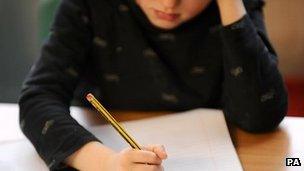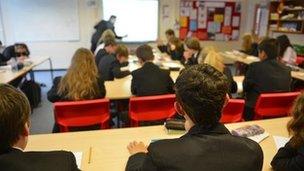Education in Wales: Room for improvement
- Published

Wales did not always perform worse than England in education
All this week, BBC Wales is looking at the state of the education system in Wales ahead of the global education league tables, PISA, being published.
Performance and the way children are taught in Wales is regularly compared with England and Northern Ireland.
But GCSE and A-level results are lower in Wales than in the other parts of the UK and several reports from schools watchdog Estyn highlights this.
However, it was not always the case.
Previously, 16 and 18-year-olds in Wales often outperformed those in England in the annual results table.
But the global PISA results of 2006 and 2009 do not paint a pretty picture.
England, Scotland and Northern Ireland were almost neck-and-neck in reading, maths and science.
Wales lagged behind by a fair bit in maths and reading, but fared better in science.
It is easy to think this rather depressing situation only came about after the creation of the Welsh Assembly in 1999, but that is not the case.
Few will remember the Loosmore Report of 1981, commissioned by the then Wales Office.
It concluded 25% of pupils in Wales left school without an O-level pass.
But referring to the report, education historians Gareth Elwyn Jones and Gordon Wynne Roderick said in their book, A History of Education in Wales: "The conclusion drawn was that, while Welsh comprehensives seemed to be serving more able pupils well, they were not as effective with lower-ability pupils and were less successful in the examination stakes than their English counterparts, having yielded an advantage associated with the former grammar schools.
"Subsequent studies pointed the fingers at old-fashioned teaching based on grammar school models, and a lack of attention to low achievers.
"This prompted research into disaffection, underachievement, management structures in schools and school-effectiveness policies..."
'Saved Welsh'
That was about a report written more than 30 years ago, but surely the points raised are still relevant today?
The fact that Wales managed to improve in the last 20 years should be encouraging.
That optimism is shared by Prof David Reynolds, education advisor to the Welsh government. He told the BBC's The Wales Report programme there was no reason to think Wales cannot top the UK countries in education.
"If we're clever and if we learn, yes," he said.
"People speak as if we're always a failure in education. We are one of the few nations in the world that saved a minority language.
"We saved Welsh through the education system. We did something right. In the 1970s we ran a fine education system here.

GCSE and A-level results are lower in Wales than in the other parts of the UK
"It's not that we don't know how to educate children but somewhere, something went wrong. But we could rediscover that."
Prof Reynolds is of the view that during the first decade of devolution, too much attention was given to developing the curriculum and not enough on raising teaching standards.
I have just returned from Finland where the curriculum is seen more as a rough guide than a strict set of guidelines.
Teachers there are highly educated and very well trained; it takes seven years to qualify and the competition to get a place on the course is fierce - just one in 10 succeed.
Schools in Finland are not monitored very closely and pupils do not sit external exams until they are 19.
It seems to me the Welsh government tried to copy some of the elements of the Finnish style during the early years of devolution and ditch many of the English policies.
SATs were dropped and league tables scrapped. Teachers were trusted to get on with the job.
But for me, that all changed following the last set of PISA results which came out in December 2010. They were disappointing.
Deprived area
The education minister at the time, Leighton Andrews, said they showed "an unacceptable fall in our overall performance. Everyone involved with education in Wales should be alarmed. There can be no excuses and no alibis".
So what was the answer? Well I'm sure the Welsh government would disagree, but it seems to me that we reintroduced some elements of the English-style education model.
We do not have league tables, but our secondary schools are now placed into 'bands' every year with performance being a contributing factor. The number eligible for free school meals is also taken into account to allow for the challenges of running a school in a deprived area, as is attendance.
The principle, though, is that we must be able to see how well our schools are doing. Something previous education ministers such as Jane Davidson veered away from.
She got rid of SATs in Wales, yet 10 years on a version of SATs has returned; from the age of seven our pupils now sit important tests every year.
So I would suggest there is more in common between the Welsh and English education systems than either would admit.
However, there is one very important aspect which is taking Wales more towards the Finnish model; teacher training.
The current Education Minister Huw Lewis says he wants the profession to be more highly regarded, as is the case in Finland. So he wants teachers in future to study a Masters of Education degree as a matter of course before teaching in Wales.
High quality teachers have been one of the cornerstones of the Finnish education system's success. The other being very little interference from the national government.
Somehow, I think we're likely to see much more of the former than the latter in Wales.